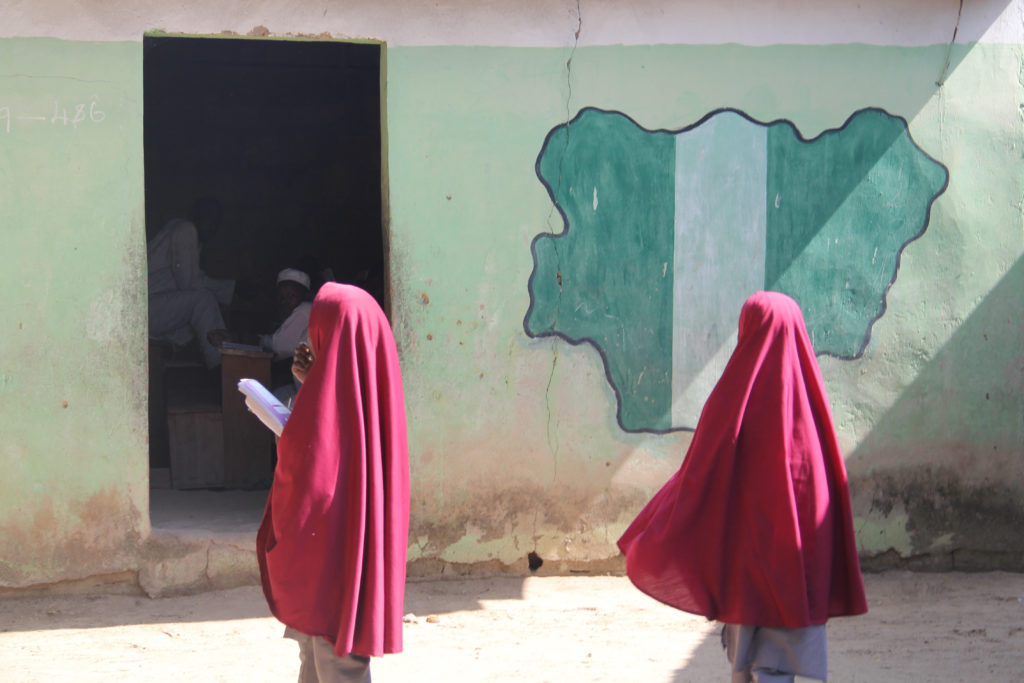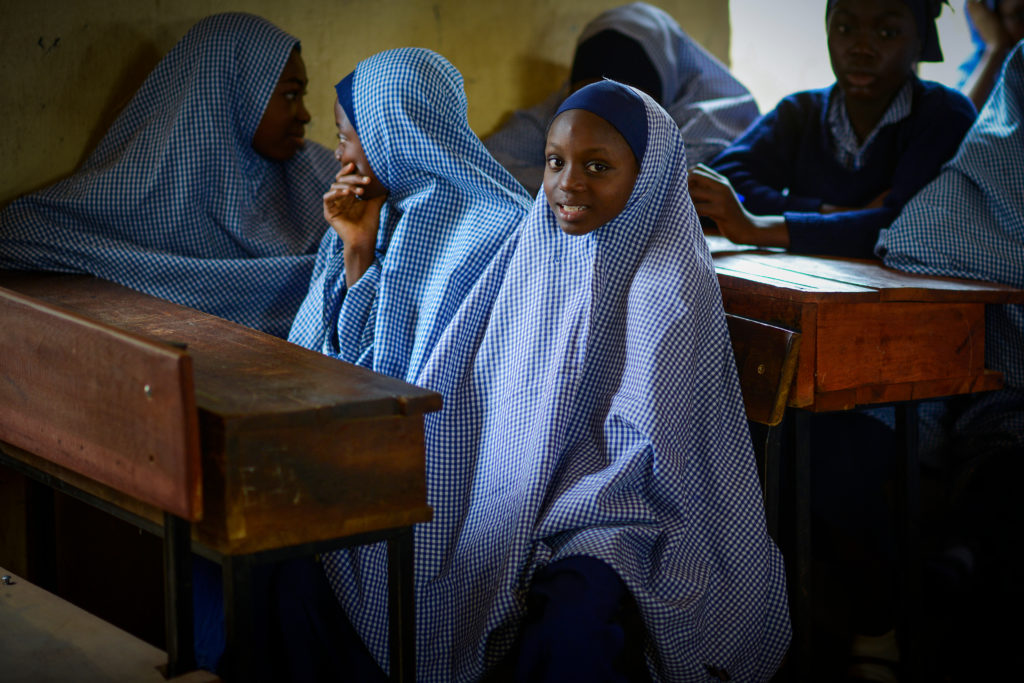As of early March 2024, Nigeria is living in a spiralling security crisis: over 380 children have been kidnapped by Islamist insurgents like Boko Haram in the country’s northeast and other criminal groups in the northwest. Thanks to the negotiations between the government and the gunmen, 137 students have been released, but many more are still kept as hostages, including 98 schoolgirls of the Chibok kidnapping in 2014. The government introduced several measures to fight student kidnappings, but the new episodes testify that a change of pace is needed.
Over 380 students kidnapped since February 2024
On 7 March 2024, criminal gangs known as “bandits” kidnapped 287 students, including many girls, at the government secondary school in Kuriga town, in northwestern Kaduna State. Two days later, bandits broke into a boarding school in Gidan Bakuso village in Sokoto State and kidnapped 15 children as they slept. The abductions have continued. Most recently, on 18 March, over 87 people were reported to have been kidnapped in Kajuru community in Kaduna State (Ewang, 2024).
Fortunately, on 24 March 2024, 137 students abducted by gunmen from a school in Kaduna were released “unharmed”, days before a ransom deadline fixed for 7 April 2024 (Aljazeera, 2024). Conflicting reports emerged from Kaduna’s Governor Uba Sani and school authorities regarding the number of students kidnapped on 7 March 2024, with figures differing at 137 and 287 respectively. Such discrepancies are typical in Nigeria’s kidnapping crisis, often due to poor record-keeping or immediate escapes by some hostages (Asadu, 2024).
The Kaduna gunmen demanded a total of 1 billion naira (USD 680,000) for the release of the children and staff and vowed to kill the victims if the payments were not made within 20 days. But Nigerian President Bola Tinubu said he would “not pay a dime” after the practice was outlawed in 2022 in a bid to clamp down on the attackers. According to this law, ransom payers face a 15-year sentence (Aljazeera, 2024).
#BringBackOurGirls: the precedent in Chibok
The recent kidnapping in Kuriga brought to mind the case of the schoolgirls in Chibok, a town in northeastern Borno state. It was April 2014 when Boko Haram, an Islamist armed group, abducted 276 girls from a government secondary school, sparking global outrage.
Some of the girls escaped captivity on their own. Some others were later released following intense global social media campaign #BringBackOurGirls run by civil society organizations, and negotiations by the government. However, of those initially abducted, 98 girls are still being held by Boko Haram.
During their stay with the kidnappers, many of the girls have experienced sexual violence, and have been trained to fight or encouraged to become suicide bombers. However, as rescue efforts continue by the Nigerian government and military, and many of the survivors are returning home, the community’s perceptions of them and children born out of sexual violence by Boko Haram, and their integration and relocation, are proving difficult.
Education in Nigeria is under attack
Education is crucial to national growth and development. However, the fear of their children being abducted has led many parents in hot zones in the northeast and northwest to pull their children out of school entirely to avoid the risk, despite the government’s introduction of free and compulsory basic education in schools. According to UNICEF, 66 percent of all out-of-school children in Nigeria are from the northeast and northwest, which also represent the poorest regions in the country (Salako, 2024).

For some girls, the consequences may be even more dire than just losing an education, as some parents may decide to marry their daughters off early to avoid them getting kidnapped or worse. More than half of the girls in Nigeria are currently not attending school at a basic level, and 48 percent of that figure are from the northeast and northwest (Salako, 2024).
Mass kidnappings are a booming industry in Nigeria
In 2014, the perpetrators of these crimes were mainly Islamic extremist groups such as Boko haram, who wanted to discourage families from sending boys and girls to school because they proclaimed that ‘Western education was a sin’ and they wanted to impose their strictest version of Islam.
Today, kidnappings for ransom seem to be the prerogative of criminal gangs interested in getting rich rather than spreading an ideology (Sibani, 2024). Terrorists and other criminals have resorted to this style of attacking schools and educational facilities and abducting learners and teachers to hit hard on the government and attract the required attention and ransom payment (Save the Children, 2023).
In poor communities, ransoms are often paid in food, fuel or vehicles (Sibani, 2024). However, in most cases, kidnappings have become a sub-economy of sorts, as abductors rake in millions of naira in ransom payments. Between July 2022 and June 2023, 3,620 people were abducted in 582 kidnapping cases with about 5 billion naira (USD 3,878,390) paid in ransoms (Salako, 2024). Previously, between 2011 and 2020, over USD 18 million were paid in ransoms (Sibani, 2024).
The government’s role in preventing kidnappings
In the aftermath of Chibok, the Nigerian government endorsed the Safe Schools Declaration, an international political commitment to protect education from attack and schools from military use which turns them into targets. In May 2014, the government also adopted a Safe School Initiative for Nigeria with the support of the global community and Nigerian business leaders.
The initiative aimed to raise funds with an initial USD 10 million pledge to help make schools safer, including by moving them to safer areas and creating a safe school model for schools across Borno, Adamawa, and Yobe, the three states worst hit by the Boko Haram insurgency. However, the multi-stakeholder initiative faced problems, and there has been a decline in momentum over the years with little or no progress made in fortifying schools (HRW, 2024).
Moreover, in 2022 Nigeria passed a bill imposing jail terms of at least 15 years for paying a ransom to free someone who has been kidnapped and made the crime of abduction punishable by death in cases where victims die (Aljazeera, 2022). Nevertheless, ransoms are commonly paid for kidnappings, often arranged by families, and it is rare for officials in Nigeria to admit to the payments.
Advocating for change and supporting kidnapped children
Despite the strong engagement of civil society organisations that pushed the State to take adequate actions for the release of the Chibok girls, the Nigerian government, past and present, saw the activities of the #BringBackOurGirls as a threat rather than a call for collective responsibility. #BringBackOurGirls’ constant and consistent demand for the release of the Chibok girls and others in Boko Haram captivity irked the previous government because it exposed its response to the kidnapping to international scrutiny (Adebiyi, 2020).
On the contrary, from an external perspective, it is clear that the role of civil society organisations and the international community as a whole played a significant role in the release of the girls as well as it put – and keeps on putting – a spotlight on the issue of kidnapping in Nigeria.

In this context, Humanium, as an NGO focused on empowering children’s rights, advocates for the release of children kidnapped and promotes an open dialogue online to engage individuals and organizations to support this cause. Join Humanium by sponsoring a child, making a donation, or becoming a member or a volunteer!
Written by Arianna Braga
References:
Adebiyi K. (2020). Mitigating the Impact of Media. Reporting of Terrorism – Case Study of the #BringBackOurGirls Campaign. Retrieved from ICCT – International Centre for Counter-Terrorism at https://www.icct.nl/sites/default/files/2022-12/StratComms-Report-Nigeria-FINAL.pdf, accessed on 12 May 2024.
Aljazeera (2022). Nigeria outlaws ransom payments, kidnap now punishable by death. Retrieved from Aljazeera at https://www.aljazeera.com/news/2022/4/27/nigeria-outlaws-ransom-payments-abduction-punishable-by-death, accessed on 5 May 2024.
Aljazeera (2024). More than 130 kidnapped Nigerian students released: Government spokesman. Retrieved from Aljazeera at https://www.aljazeera.com/news/2024/3/24/hundreds-of-kidnapped-nigerian-students-released-after–more-than-two-weeks, accessed on 5 May 2024.
Asadu, C. (2024). Over 130 abducted schoolchildren in Nigeria’s northwest are rescued after weeks in captivity. Retrieved from AP News at https://apnews.com/article/nigeria-school-kidnapping-kaduna-kuriga-released-4afc5681954d75c3c790a1ebe4263056, accessed on 5 May 2024.
HRW (2024). Nigeria: 10 Years After Chibok, Schoolchildren Still at Risk. Retrieved from Human Rights Watch at https://www.hrw.org/news/2024/04/11/nigeria-10-years-after-chibok-schoolchildren-still-risk, accessed on 5 May 2024.
Premium Times (2024). Tinubu vows not to pay ransom to kidnappers of Kaduna students, others. Retrieved from Premium Times at https://www.premiumtimesng.com/news/top-news/677126-tinubu-vows-not-to-pay-ransom-to-kidnappers-of-kaduna-students-others.html, accessed on 5 May 2024.
Salako P. (2024). Why mass kidnappings still plague Nigeria a decade after Chibok abductions. Retrieved from Aljazeera at https://www.aljazeera.com/features/2024/4/3/why-mass-kidnappings-still-plague-nigeria-a-decade-after-chibok-abductions, accessed on 5 May 2024.
Save the Children (2023). Education under attack in Nigeria. retrieved from Save the Children at https://resourcecentre.savethechildren.net/pdf/ATTACK-ON-EDUCATION.pdf/, accessed on 5 May 2024.
Sibani, F. (2024). Il ritorno dei rapimenti in Nigeria. Retrieved from Internazionale at https://www.internazionale.it/notizie/francesca-sibani/2024/03/15/rapimenti-nigeria, accessed on 7 May 2024.
The Guardian (2024). Nigerian army rescues students kidnapped two weeks ago. Retrieved from The Guardian at https://www.theguardian.com/world/2024/mar/23/nigerian-army-rescues-students-kidnapped-two-weeks-ago, accessed on 5 May 2024.


